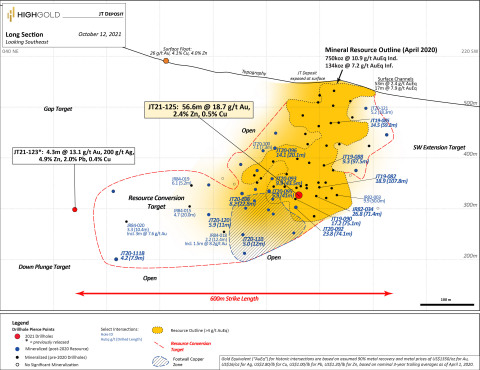Includes 114.4 g/t Au over 4.9 meters and 64.7 g/t Au over 5.0 meters
HighGold Mining Inc. (TSX-V:HIGH, OTCQX:HGGOF) (“HighGold” or the “Company”) is pleased to announce assay results from the ongoing 2021 drill program at its 0.75 Moz Indicated 10.9 g/t gold equivalent (“AuEq”) Johnson Tract polymetallic Gold Project (“Johnson Tract”, “JT” or the “Project”) in Southcentral Alaska, USA.
This press release features multimedia. View the full release here: https://www.businesswire.com/news/home/20211013005427/en/

Figure 1. Johnson Tract Project – Longitudinal Section for the JT Deposit showing the location of Hole JT21-125 (Graphic: Business Wire)
Hole JT21-125 is an infill hole designed with the dual purpose of collecting material to support a Phase I metallurgical testing program and to provide better definition of the deeper, higher-grade portion of the JT Deposit (Figure 1). The hole successfully intersected a long interval of gold-dominant mineralization with significantly higher gold grade than the average of the JT Deposit resource. True thickness of the JT Deposit typically ranges from 20 to 50 meters and in the JT21-125 intersection is over 35 meters.
Drill Highlights Hole JT21-125
-
18.69 g/t Au, 2.43% Zn, 0.47% Cu over 56.6m, including
- 31.69 g/t Au, 1.82% Zn, 0.58% Cu over 32.9m, including two high-grade intervals of
- 64.74 g/t Au, 1.49% Zn, 0.53% Cu over 5.0m and
- 114.37 g/t Au, 3.51% Zn, 0.33% Cu over 4.9m
“We are very pleased to report this new intercept from the deeper reaches of the JT Deposit that confirms the strength of the mineralizing system,” commented President and CEO Darwin Green. “In combination with the recent drill results from the DC Prospect 4km to the northeast, the Johnson Tract Project continues to establish itself as one of the pre-eminent high-grade gold exploration projects located in the USA.”
Discussion of JT Deposit Infill Results
Assay results reported today include an intersection from infill drilling at the JT Deposit from hole JT21-125. The hole was designed as a dual-purpose infill and metallurgical test hole to gather sample material through the JT Deposit for the 2021 Phase I Metallurgical Testing Program. The hole successfully intersected typical ‘JT-style’ mineralization in silicified, veined and brecciated dacite tuff over 56.6 meters from 236.7-293.3m in the deeper portion of the JT Deposit. The drill hole was collared on the northwest side of the deposit at an azimuth/dip of 130/-46 degrees, oriented to cut across the mineralized zone in the opposite direction to most previous holes with the objective of better defining the continuity and orientation of high-grade gold mineralization. Details on the metallurgical test work program are presented below.
The location of infill hole JT21-125 in relation to the JT Deposit is presented on a longitudinal section in Figure 1 with details on assay composites presented in Table 1. The Au-Cu-Zn-Ag-Pb mineralization associated with the JT Deposit has been defined over a total strike length of 600 meters and remains open along strike to the northeast and southwest, and at depth.
Table 1. Johnson Tract Project – Assay Composites for Drill Hole JT21-125. |
||||||||
|
|
|
|
|
|
|
|
|
Drill Hole |
From (m) |
To (m) |
Width (m) |
Au (g/t) |
Ag (g/t) |
Zn (%) |
Cu (%) |
Pb (%) |
JT21-125 |
236.7 |
293.3 |
56.6 |
18.69 |
3.9 |
2.43 |
0.47 |
0.36 |
Including |
260.4 |
293.3 |
32.9 |
31.69 |
5.1 |
1.82 |
0.58 |
0.47 |
Including |
273.4 |
278.4 |
5.0 |
64.74 |
7.4 |
1.49 |
0.53 |
0.88 |
And Incl. |
288.4 |
293.3 |
4.9 |
114.37 |
10.5 |
3.51 |
0.33 |
<0.01 |
True thickness for the intersection in hole JT21-125 is estimated at 65% to 75% of drilled width.
2021 Phase I Metallurgical Testing Program
Blue Coast Metallurgy & Research has been engaged to carry out a Phase I metallurgical testwork program on the JT Deposit using selected drill core from the 2021 drill program. The Program will: a) complete test work to confirm historic metallurgical results reported by previous operators and identify possible opportunities for improvement; and b) advance the metallurgy to support potential future PEA-level process design. The Program will include QEMSCAN mineralogical studies, identification of potential geometallurgical domains, grindability/gravity/flotation test work, and the development of a flowsheet for recovery of pay metals to marketable end products. Two (2) composites are currently being considered from the upper and lower JT Deposit domains, and potentially a third composite from the Footwall Copper Zone (“FWCZ”). Drill hole JT21-125 reported in this news release is from the lower JT Deposit domain, located at a deeper level within the deposit.
Current Exploration Activities
Three (3) diamond drill rigs are currently operating on the Project in concert with a regional geological mapping and geochemical sampling program, air and ground-based geophysical surveying, and a Phase I metallurgical sampling program. The current phase of drilling is scheduled to conclude on or before month end. Assays results will be released on an ongoing basis pending review and meeting Company quality assurance-quality control protocols. An updated mineral resource estimate is planned for the JT Deposit in early 2022, following the completion and receipt of all assays from the 2021 drill program. The new resource estimate will incorporate new drilling completed in 2020 and 2021. Over 30,000 meters have been drilled on the Project since the maiden resource.
About the Johnson Tract Gold Project
Johnson Tract is a poly-metallic (gold, copper, zinc, silver, lead) project located near tidewater, 125 miles (200 kilometers) southwest of Anchorage, Alaska, USA. The 21,000-acre district scale property includes the high-grade Johnson Tract Deposit (“JT Deposit”) and at least nine (9) other mineral prospects over a 12-kilometer strike length. HighGold acquired the Project through a lease agreement with Cook Inlet Region, Inc. (“CIRI”), one of 12 land-based Alaska Native regional corporations created by the Alaska Native Claims Settlement Act of 1971. CIRI is owned by more than 9,100 shareholders who are primarily of Alaska Native descent.
Mineralization at Johnson Tract occurs in Jurassic-age intermediate volcaniclastic rocks and is characterized as epithermal-type with submarine volcanogenic attributes. The JT Deposit is a thick, steeply dipping silicified body (20m to 50m average true thickness) that contains a stockwork of quartz-sulphide veinlets and brecciation, cutting through and surrounded by a widespread zone of anhydrite alteration. The Footwall Copper Zone is located structurally and stratigraphically below JT Deposit and is characterized by copper-silver rich mineralization. To date, the Au-Cu-Zn-Ag-Pb mineralization associated with the JT Deposit has been defined over a total strike length of 600 meters and to a depth of 350 meters and remains open along strike to the northeast and southwest, and at depth.
The JT Deposit hosts an Indicated Resource of 2.14 Mt grading 10.93 g/t gold equivalent (“AuEq”) comprised of 6.07 g/t Au, 5.8 g/t Ag, 0.57% Cu, 0.80% Pb and 5.85% Zn. The Inferred Resource of 0.58 Mt grading 7.16 g/t AuEq is comprised of 2.05 g/t Au, 8.7 g/t Ag, 0.54% Cu, 0.33% Pb, and 6.67% Zn. For additional details see NI 43-101 Technical Report titled “Updated Technical Report for the Johnson Tract Project, Alaska” is dated August 9, authored by Ray C. Brown, CPG, and James N. Gray, P.Geo. Gold Equivalent is based on assumed metal prices and 90% recovery for Au, Ag, Cu, Pb, and Zn. Assumed metal prices for the Resource are US$1350/oz for gold (Au), US$16/oz for silver (Ag), US$2.80/lb for copper (Cu), US$1.00/lb for lead (Pb), and US$1.20/lb for zinc (Zn) and are based on nominal 3-year trailing averages as of April 1, 2020. Historical metallurgical testing on drill core samples has indicated that good gold and base metal recoveries and marketable concentrates can be expected.
Prior to HighGold, the Project was last explored in the mid-1990s by a mid-tier mining company that evaluated direct shipping material from Johnson to the Premier Mill near Stewart, British Columbia.
About HighGold
HighGold is a mineral exploration company focused on high-grade gold projects located in North America. HighGold’s flagship asset is the high-grade Johnson Tract Gold (Zn-Cu) Project located in accessible Southcentral Alaska, USA. The Company also controls a portfolio of quality gold projects in the greater Timmins gold camp, Ontario, Canada that includes the Munro-Croesus Gold property, which is renowned for its high-grade mineralization, and the large Golden Mile and Golden Perimeter properties. HighGold’s experienced Board and senior management team, are committed to creating shareholder value through the discovery process, careful allocation of capital, and environmentally/socially responsible mineral exploration.
Ian Cunningham-Dunlop, P.Eng., VP Exploration for HighGold Mining Inc. and a qualified person ("QP") as defined by Canadian National Instrument 43-101, has reviewed and approved the technical information contained in this release.
On Behalf of HighGold Mining Inc.
“Darwin Green”
President & CEO
For further information, please visit the HighGold Mining Inc. website at www.highgoldmining.com.
Additional notes:
The starting azimuth and dip (Azimuth/-Dip) for drillhole JT21-125 is 130/-46 degrees. Samples of drill core were cut by a diamond blade rock saw, with half of the cut core placed in individual sealed polyurethane bags and half placed back in the original core box for permanent storage. Sample lengths typically vary from a minimum 0.5 meter interval to a maximum 2.0 meter interval, with an average 1.0 to 1.5 meter sample length. Drill core samples are shipped by air and transport truck in sealed woven plastic bags to ALS Minerals sample preparation facility in Reno, Nevada for sample preparation and analysis. ALS Minerals operate according to the guidelines set out in ISO/IEC Guide 25. Gold is determined by fire-assay fusion of a 50 g sub-sample with atomic absorption spectroscopy (AAS). Samples that return values >10 ppm gold from fire assay and AAS are determined by using fire assay and a gravimetric finish. Various metals including silver, gold, copper, lead and zinc are analyzed by inductively-coupled plasma (ICP) atomic emission spectroscopy, following multi-acid digestion. The elements copper, lead and zinc are determined by ore grade assay for samples that return values >10,000 ppm by ICP analysis. Silver is determined by ore grade assay for samples that return >100 ppm.
The Company has a robust QAQC program that includes the insertion of blanks, standards and duplicates.
Neither TSX Venture Exchange nor its Regulation Services Provider (as that term is defined in the policies of the TSX Venture Exchange) accepts responsibility for the adequacy or accuracy of this release.
Forward looking statements: This news release includes certain “forward-looking information” within the meaning of Canadian securities legislation and "forward-looking statements" within the meaning of the United States Private Securities Litigation Reform Act of 1995 (collectively “forward looking statements”). Forward-looking statements include predictions, projections and forecasts and are often, but not always, identified by the use of words such as “seek”, “anticipate”, “believe”, “plan”, “estimate”, “forecast”, “expect”, “potential”, “project”, “target”, “schedule”, “budget” and “intend” and statements that an event or result “may”, “will”, “should”, “could” or “might” occur or be achieved and other similar expressions and includes the negatives thereof. All statements other than statements of historical fact included in this release, including, without limitation, statements regarding the Company’s currently ongoing drill program and pending assays are forward-looking statements that involve various risks and uncertainties. There can be no assurance that such statements will prove to be accurate and actual results and future events could differ materially from those anticipated in such statements. Forward-looking statements are based on a number of material factors and assumptions. Important factors that could cause actual results to differ materially from Company’s expectations include actual exploration results, changes in project parameters as plans continue to be refined, results of future resource estimates, future metal prices, availability of capital and financing on acceptable terms, general economic, market or business conditions, uninsured risks, regulatory changes, defects in title, availability of personnel, materials and equipment on a timely basis, accidents or equipment breakdowns, delays in receiving government approvals, unanticipated environmental impacts on operations and costs to remedy same, and other exploration or other risks detailed herein and from time to time in the filings made by the Company with securities regulators. Although the Company has attempted to identify important factors that could cause actual actions, events or results to differ from those described in forward-looking statements, there may be other factors that cause such actions, events or results to differ materially from those anticipated. There can be no assurance that forward-looking statements will prove to be accurate and accordingly readers are cautioned not to place undue reliance on forward-looking statements.
View source version on businesswire.com: https://www.businesswire.com/news/home/20211013005427/en/
Contacts
Darwin Green, President & CEO or Naomi Nemeth, VP Investor Relations
Phone: 1-604-629-1165 or North American toll-free 1-855-629-1165
Email: information@highgoldmining.com.
Website: www.highgoldmining.com
Twitter: @HighgoldMining





